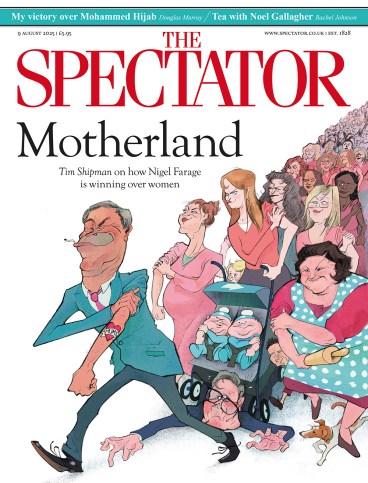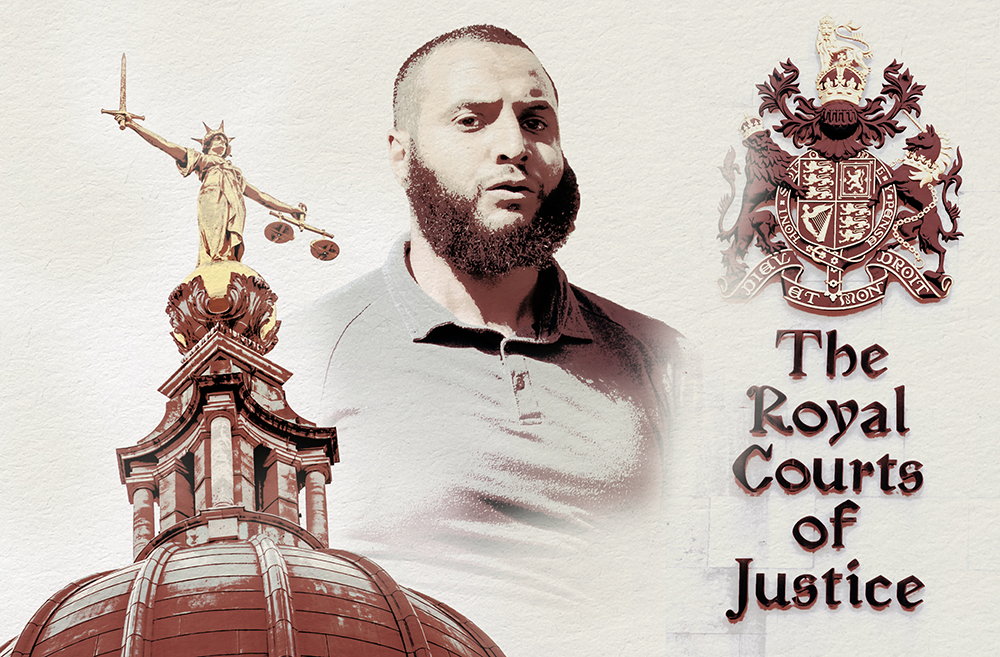
Mohammed Hijab sat at the back of the courtroom and ate doughnuts while his lawyer, Mark Henderson, delivered his closing submission. ‘You will have seen that my client is argumentative, can be provocative,’ said Henderson. ‘Some people might think that he is a bit of a smart alec, a bit too cocky.’ Hijab reclined in his chair and licked the sugar from his fingers.
Hijab acted like a schoolboy throughout last month’s four-day trial at the Royal Courts of Justice. He laughed and shouted while giving evidence. ‘It’s an unsalvageable case, Greg! It really is!’ he yelled at The Spectator’s legal counsel Greg Callus at the end of his second day in the stand, leaning over the side.
Well, he lost. Hijab sued The Spectator and Douglas Murray over Douglas’s column of 24 September 2022, claiming that Douglas had misrepresented what he said in a speech in Leicester during the sectarian disorder there three years ago. In his ruling this week, Mr Justice Johnson has confirmed that what Douglas wrote is ‘substantially true’.
We can now repeat it: Mohammed Hijab is a street agitator who whipped up his followers in Leicester during the unrest there between Muslims and Hindus. He mocked Hindus, and claimed that they must live in fear because they have been reincarnated as ‘pathetic, weak, cowardly people’.
On 18 September 2022, with Leicester in chaos, Hijab travelled there from London and made sectarian tensions worse. ‘Let me tell you something,’ he said to a gathered crowd of mostly masked Muslim men. ‘All due respect, actually no due respect, yeah, if they believe in reincarnation, yeah, what a humiliation and pathetic thing for them to be reincarnated into some pathetic, weak, cowardly people like that. I’d rather be an animal.’
In his column, Douglas said that Hijab had attacked Hindus in this speech; in court, Hijab said that he had only criticised Hindutva (extreme Hindu nationalists). Hijab tried to argue that it was possible that a Hindutva could be a non-Hindu. Therefore, Douglas had defamed him. When asked by Callus to name a non-Hindu Hindutva, Hijab struggled. In the moment, he could only think of one: Benjamin Netanyahu. He later remembered two others: Tommy Robinson and Douglas Murray.
Phrases such as ‘not credible’, ‘not consistent’, ‘untenable’ and ‘confected’ fill the judgment
Hijab’s case was a pile of unbelievable claims of this kind. At one point, the court was played a video of a seminar he hosted in April 2022, before the disturbances in Leicester, where he openly smirked while asking Hindus about their belief in reincarnation. The Spectator’s lawyers wanted to show that he had form for ridiculing the religion. ‘What would you choose to be? A bear or a gorilla?’ Hijab said in the video. ‘I would rather be a bear because if a bear and a gorilla had a fight, the bear would win.’ ‘Is she the one with the four arms?’ he also said, when referring to a Hindu deity.
Hijab continued to smile in the stand as these clips were played, then tried to claim to the court that they showed him a ‘humble learner’ making genuine enquiries. Of course he was not mocking Hindus. The judge did not buy any of it. Phrases such as ‘not credible’, ‘not consistent’, ‘untenable’ and ‘confected’ fill his judgment. He calls Hijab a liar.
Hijab has previously tried to bully British publications who cross him, threatening them with lawsuits worth many hundreds of thousands of pounds in damages and legal fees. In this case, Hijab said that three contracts with three organisations had been cancelled because of Douglas’s article. The Spectator argued, and Johnson agrees, that the messages showing that these unevidenced contracts were apparently cancelled as a result of the article in order that Hijab could claim damages were contrived and implausible.
Hijab’s evidence for these damages verged on comic. In one instance, a man who intended to ‘cancel’ Hijab’s ‘contract’, who had known him for years and called him ‘bro’ over WhatsApp, informed Hijab of the news over email. He addressed him formally, as if they’d never met, with the formal salutation of ‘Dear Mr Hegab’. (Mohammed Hegab is Hijab’s real name.) It seemed Hijab and his mates wanted this flimsy evidence to look more official.
When Hijab was not shouting, smirking, lolling in his chair or eating doughnuts, he looked at a printout of Douglas’s column, the one he was suing over, with Douglas’s caricature at the top. Hijab had been desperate to ‘debate’ Douglas for years, and had hoped that the two would meet in court. In the end, he didn’t get the satisfaction, because Douglas wisely decided not to attend.
Watch Max discuss the trial on Spectator TV:






